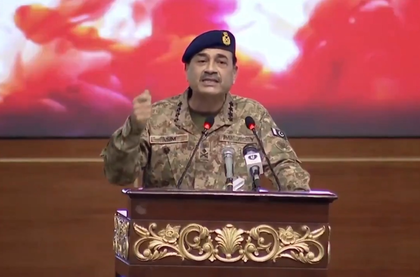Pakistani military basks in fake victory narrative amid deepening crisis: Report
By IANS | Updated: September 10, 2025 21:15 IST2025-09-10T21:12:12+5:302025-09-10T21:15:18+5:30
Islamabad, Sep 10 The Pakistani military establishment has exploited its "fake victory narrative" from the May conflict with ...

Pakistani military basks in fake victory narrative amid deepening crisis: Report
Islamabad, Sep 10 The Pakistani military establishment has exploited its "fake victory narrative" from the May conflict with India to silence dissent, marginalise civilian institutions, and deflect attention from structural failures in Pakistan, a report cited on Wednesday.
It stated that as the country grapples with a worsening crisis, including security challenges, economic instability, human rights abuses, and environmental disaster, the Pakistani Army basked in the manufactured wave of triumphalism.
“Pakistan’s attempt to project strength after the May 2025 conflict with India is dangerously misleading. The military has significantly consolidated power, basking in adulation and parades, but the underlying crises of security, economy, governance, human rights, and environment have only worsened. Far from strengthening the nation, the war has emboldened the army to tighten its grip on power while ordinary Pakistanis bear the brunt of inflation, violence, repression, and natural calamities,” a report in leading Sri Lankan newspaper ‘Daily Mirror’ detailed.
According to the report, Pakistan’s economy has deteriorated further since May as the military conflict with India worsened an already fragile situation, rattling investors and escalating defense expenditures.
Earlier this year, it said, Pakistan narrowly escaped default after receiving emergency loans from China, Saudi Arabia, and the IMF. Although Islamabad recently touted an increase in foreign reserves to approximately $20 billion, these gains are built on borrowed funds and temporary rollovers rather than sustainable growth.
“On the political side, Pakistan has slid deeper into authoritarianism. Since May, the army has capitalized on its popular standing to further marginalize democratic institutions. Opposition politicians, journalists, and activists have been relentlessly targeted. In July, authorities ordered YouTube to block more than two dozen opposition and journalist-run channels, branding them ‘anti-state’,” the report highlighted.
“The security situation has grown particularly dire. Militant groups have intensified attacks in Khyber Pakhtunkhwa and Balochistan, inflicting heavy casualties on Pakistani security forces. The Tehreek-e-Taliban Pakistan (TTP) and Islamic State offshoots have increased their presence in the border areas of Khyber Pakhtunkhwa province despite the military’s claims of winning the war on terrorism,” it added.
The report emphasised that human rights groups warned that abuses by Pakistani security forces, including enforced disappearances, torture, and extrajudicial killings, are on the rise in recent months, which risks deepening alienation, strengthening separatist narratives rather than undermining them.
In August, US Senator Chris Van Hollen condemned Pakistan’s escalating human rights violations, cautioning that arbitrary arrests and enforced disappearances threaten US-Pakistan relations. The European Union’s Ambassador in Islamabad similarly raised alarm about “clear degradation” of rights, warning that trade privileges could be suspended if conditions in Pakistan do not improve.
“These rebukes highlight how Pakistan’s authoritarian slide, accelerated since the conflict, is damaging both its domestic political fabric and its international reputation,” the report noted.
Disclaimer: This post has been auto-published from an agency feed without any modifications to the text and has not been reviewed by an editor
Open in app